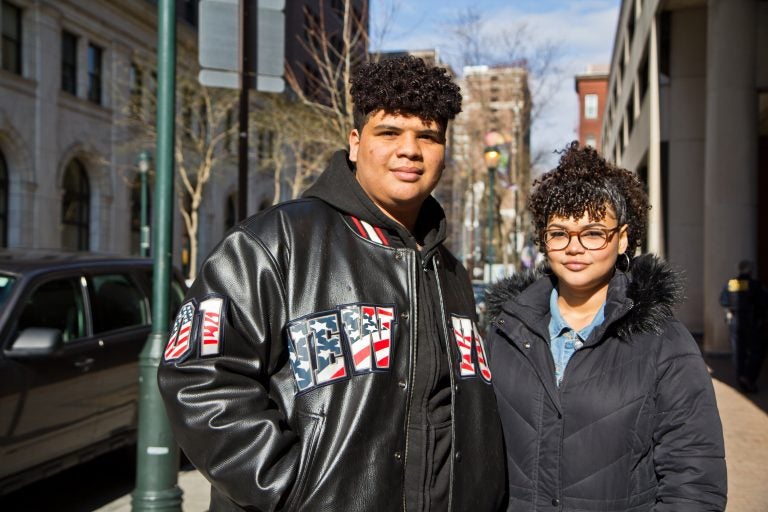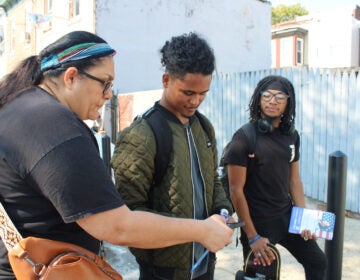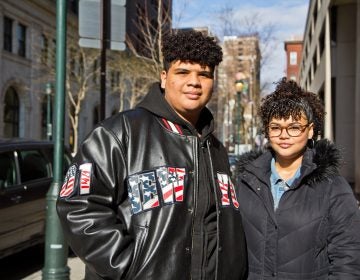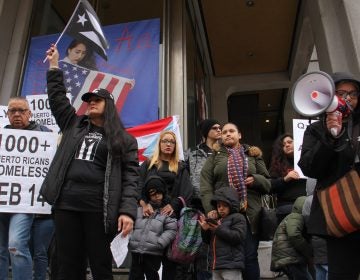Even with jobs and plans for a future in Philly, some Puerto Rican evacuees face imminent homelessness
It’s been more than six months since Hurricane Maria hit Puerto Rico. Yet some of the 900 families who came to Philadelphia looking for refuge, are still facing homelessness.
Listen 1:49
Puerto Rican evacuees Crisjoel Morales Monet, 17, and Judy Morales Monet, 16, are staying at the Holiday Inn Express in Center City with their mom and oldest brother Friday April 20th. They still don't know where to go next. (Kimberly Paynter/WHYY)
It’s been more than six months since Hurricane Maria hit Puerto Rico. Yet some of the 900 families who came to Philadelphia looking for refuge, are still facing homelessness.
This weekend, about 21 families staying in city hotel rooms through Federal Emergency Management Agency’s Temporary Shelter Assistance program (TSA) will have to find somewhere else to stay. Advocates couldn’t reach everyone in FEMA’s list — some of them may have left the city already — but confirmed that at least 12 families have not been able to secure a long-term place to stay and will be facing homelessness after their TSA waiver expires on April 20th.
The Morales family is one of the 12. Siblings Judy and Crisjoel Morales Monet, 16 and 17 years old, came with their mom and oldest brother from Fajardo, a small eastern city bordering the Atlantic Ocean, last December 4th. At first they stayed with an aunt, but as they say “guests, like fish, stink after three days”. So after two months, they were kicked out. On Friday, the family will have to leave their room at the Holiday Inn Express in Center City.
“We don’t have where to stay,” Crisjoel Morales said. “If we are kicked out of the hotel, we are totally left on the street.”
Not having a room will also affect the Morales’ ability to go to school. They are using the hotel’s wifi and accommodations to attend Esperanza Cyber Charter School, an online school in Philadelphia.
Most of the families in the situation of the Morales family got a letter from FEMA on April 14th saying they could stay in their hotel rooms until May 14th. But two days later, they got a new letter or phone message saying they had to leave this Friday.
Judy Morales said if FEMA could extend their stay until next month, the family could save some money to rent an apartment — their mother and oldest brother just got jobs as hotel housekeepers. Many of the other families staying at hotels have also recently found jobs and are saving to be able to pay the three months of rent needed to get a place in the city.
City agencies, the Latino community, nonprofits and faith-based organizations have been trying to find long-term solutions for families like the Morales for months. But it has taken them time to find the resources needed to find jobs, housing, schools and English classes for more than 2,000 evacuees coming to Philadelphia from almost every corner of the island mostly from September to December — although some are still coming.
Evacuee families and Puerto Rican advocates say there have been a lot of meetings trying to find solutions, but not a lot of action.
“I’m asking the question, until when Jim Kenney. Until when city officials, state officials? Until when, FEMA, you’re going to keep playing with this families,” said Charito Morales, a Puerto Rican activist that has been working with evacuees for months. [Charito Morales is not related to the Morales Monet family] “Come up with a solution and stop this.”
FEMA said in a statement that the aid to cover hotel rooms was designed to provide temporary help, while people saved money and made long-term plans. There are 108 families in Pennsylvania staying in hotels now.
The City of Philadelphia has granted five public houses for Puerto Rican evacuees through a Philadelphia Housing Authority program that gives special preference for people displaced by natural disasters. PHA’s spokeswoman Nichole Tillman said that the families recommended by the local long-term recovery group have already been matched with homes.
“Three of the five families required accommodation for wheelchairs and we have met those special needs,” Tillman wrote in an email. “The families will be able to move in as soon as we complete the verification of their information. The process is expected to be completed within the next two weeks.”
Mayor Jim Kenney has not recently urged FEMA for an extension of the hotel program past April 20th, although city spokeswoman Ajeenah Amir said in an email he’s planning to make the request. She did not specify when the request would be made. New York City’s Bill de Blasio called FEMA to extend the TSA last Sunday on Twitter and Facebook, attaching a letter signed by nine nine members of Congress, 11 city councilmembers and multiple community leaders.
The Trump Administration cannot abandon Puerto Rico. New York City’s leaders are calling on FEMA to extend the Temporary Shelter Assistance deadline. Otherwise, we’ll do the job for them. pic.twitter.com/ELP759MAzt
— Bill de Blasio (@NYCMayor) April 15, 2018
Julia Menzo, coordinator of disaster preparedness and recovery for Liberty Lutheran and Southeastern Pennsylvania VOAD co-chair, has been leading the efforts of the long-term recovery group created to help Puerto Rican evacuees. The group of more than 40 organizations has got funding from state, federal, local and church communities — but she said it’s taking time to get all the processes sorted out.
Menzo said housing has been the number one problem in Philadelphia and right now they’re trying to identify apartments or empty spaces that could be rehab in a short period of time. But they’ve been striving to locate that.
“Many of us have been working around the clock trying to find solutions for these families, trying to do the best we can with very little resources,” Menzo said. “At the same time is frustrating, and unacceptable, and heartbreaking that we know that we’re facing a situation where there’s 12 families that are facing some difficult decisions they’re going to have to make in the last couple of days.”
Before now, local emergency management entities never needed to respond to a disaster that happened outside of Philadelphia. Menzo said there were no systems or resources in place for a situation like this. But she hopes cities around the country are taking notes.
And some already are. A research team from Jacksonville State University is studying the formation of the Greater Philadelphia Long-Term Recovery Committee as a model because they believe — although they’re still waiting for confirmation — it represents “a historic, first of its kind effort to establish a Long-Term Recovery Committee to help survivors of a devastating disaster outside the area of impact,” wrote Laura Olson, a member of the team.
Hurricane season in Puerto Rico is starting in June, and many fear how it will affect the island’s already beaten up infrastructure, sending more evacuees to the continent.
“We are anticipating more volatile weather, so this is something we’re going to continue to face in terms of people maybe fleeing from disasters in other parts of the country to places where the disaster didn’t happen,” Menzo said. “So this is a situation that the country is going to have to be looking at.”
For now, the long-term recovery group is urgently looking for housing alternatives for families like the Morales, who want to stay in Philadelphia no matter what.
“At least here we have something to eat,” Crisjoel Morales said.
WHYY is your source for fact-based, in-depth journalism and information. As a nonprofit organization, we rely on financial support from readers like you. Please give today.







